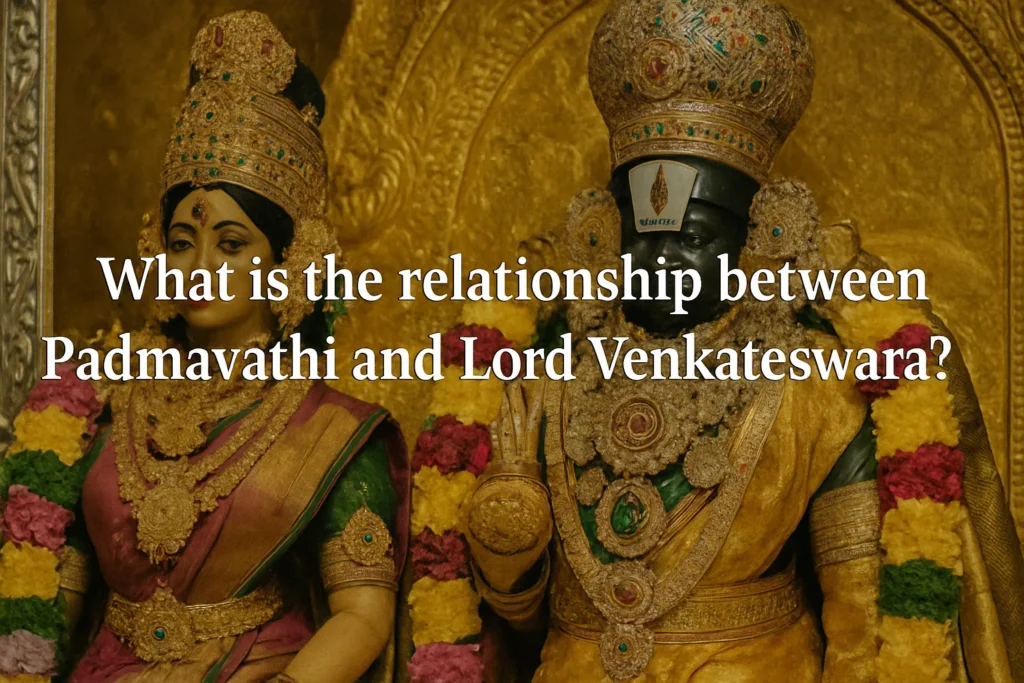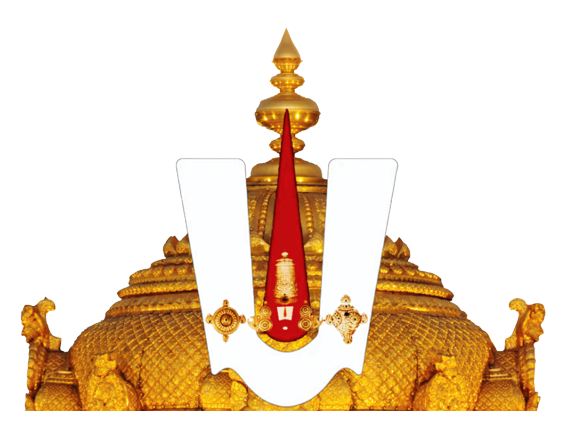Discover the sacred bond between Goddess Padmavathi and Lord Venkateswara through ancient mythology, theological significance, temple traditions, and festivals. Learn how this divine relationship continues to inspire millions of devotees and shapes worship practices at Tirumala and Tiruchanur temples.
In the rich tapestry of Hindu mythology and devotional traditions, few divine relationships hold as much significance as the sacred bond between Goddess Padmavathi and Lord Venkateswara. This celestial union represents not just a divine marriage but embodies profound spiritual principles that have influenced Hindu religious practices, temple traditions, and cultural expressions for centuries. As a devotee who has visited Tirumala and Tiruchanur numerous times over the past two decades, I’ve witnessed firsthand how this divine relationship continues to inspire millions of pilgrims who seek blessings from this divine couple.

Table of Contents
The Mythological Origins of the Divine Couple
The story of Padmavathi and Venkateswara is beautifully narrated in several sacred texts, particularly in the Sri Venkatachala Mahatmyam and regional Puranas. According to these ancient scriptures, their divine relationship begins with a fascinating tale of incarnation, discovery, and divine marriage.
Padmavathi’s Divine Birth
Goddess Padmavathi is believed to be an incarnation of Goddess Lakshmi, the eternal consort of Lord Vishnu. The legend recounts that after a disagreement with Lord Vishnu at Vaikuntha (the celestial abode), Goddess Lakshmi descended to Earth and was born in a miraculous manner.
The story goes that a sage named Bhrigu once tested the Trimurtis (Brahma, Vishnu, and Shiva) to determine who was the most worthy of worship. When he visited Vaikuntha and kicked Lord Vishnu on His chest—the abode of Goddess Lakshmi—the Lord did not react in anger but instead apologized to the sage for the hardness of His chest that might have hurt Bhrigu’s foot. Goddess Lakshmi, however, felt insulted that Her Lord did not protect Her sanctity and left Vaikuntha.
Lord Vishnu, unable to bear the separation, descended to Earth as Lord Venkateswara and settled on the Venkata Hill (now known as Tirumala). Meanwhile, Goddess Lakshmi was born as Padmavathi to King Akasa Raja and Queen Dharani Devi of the nearby kingdom after they found her in a lotus flower while plowing a field for a ritual sacrifice. This miraculous discovery gave her the name “Padmavathi,” meaning “one who emerged from a lotus.”
The Divine Meeting and Courtship
As Padmavathi grew into a woman of incomparable beauty and virtue, she once encountered Lord Venkateswara, who had disguised Himself as a hunter in the forest near her palace. Various versions of the legend describe their meeting—some say she was plucking flowers for her daily worship when she met the handsome hunter, while others narrate that she was on a pleasure trip with her companions.
Their meeting was instantaneous divine recognition, as souls that were separated were finding each other again. Lord Venkateswara, captivated by Padmavathi’s beauty and grace, decided to seek her hand in marriage. He approached Sage Narada to act as a divine intermediary to convey His proposal to King Akasa Raja.
The Divine Wedding (Kalyanam)
The divine wedding of Padmavathi and Venkateswara is one of the most celebrated events in Hindu mythology and is reenacted annually with great devotion and splendor at temples in Tirumala and Tiruchanur. However, the path to this celestial union wasn’t straightforward.
When Lord Venkateswara sought Padmavathi’s hand in marriage, King Akasa Raja set conditions that included a substantial wedding dowry. To fulfill this requirement, the Lord had to take a loan from Kubera, the god of wealth. Legend has it that Lord Venkateswara is still repaying this debt, which is why devotees make offerings in His Hundi (donation box) at Tirumala.
The wedding was attended by all the gods and goddesses, with Lord Brahma officiating the ceremony and Lord Shiva blessing the divine couple. This celestial marriage symbolizes the reunion of the divine cosmic energy—Vishnu and Lakshmi coming together again in their earthly incarnations as Venkateswara and Padmavathi.
Theological Significance of the Divine Union
The relationship between Padmavathi and Lord Venkateswara goes beyond a mythological narrative—it embodies profound theological concepts central to Hindu philosophy, particularly Vaishnavism.
The Principle of Divine Complementarity
In Hindu theology, the divine masculine (represented by Lord Venkateswara/Vishnu) and the divine feminine (represented by Goddess Padmavathi/Lakshmi) are seen as complementary aspects of ultimate reality. Together, they represent the perfect balance of cosmic energies. Vishnu symbolizes preservation, stability, and cosmic order, while Lakshmi embodies prosperity, abundance, and divine grace.
This complementarity is reflected in the concept of Shri-Vishnu Tattva, where the divine couple is inseparable despite appearing as distinct entities. They represent two aspects of the same divine reality—different in manifestation but unified in essence.
Mediatory Role of the Divine Mother
One of the most significant theological aspects of Padmavathi’s relationship with Venkateswara is her role as a divine mediator between devotees and the Lord. In Vaishnavite tradition, Goddess Padmavathi (as an incarnation of Lakshmi) is often referred to as “Purusha Kara” or the divine intercessor who pleads with the Lord on behalf of devotees.
This concept emerges from the understanding that while Lord Venkateswara represents cosmic law and justice, Goddess Padmavathi embodies compassion and mercy. When devotees approach the divine couple, they often pray to Padmavathi first, believing that she will soften the Lord’s heart and help obtain His blessings more readily.
This theological understanding is reflected in the pilgrimage tradition where devotees are encouraged to visit Tiruchanur (the abode of Goddess Padmavathi) before ascending to Tirumala (the abode of Lord Venkateswara). The belief is that one should seek the Mother’s permission and blessing before approaching the Father.
Temple Traditions and Worship Practices
The divine relationship between Padmavathi and Venkateswara has shaped unique temple traditions and worship practices that continue to this day in the sacred complexes of Tirumala-Tirupati-Tiruchanur.
The Twin Temples: Geographical Expression of Divine Union
The divine relationship is geographically expressed through two magnificent temples: the Sri Venkateswara Temple at Tirumala (situated on a hill) and the Sri Padmavathi Ammavari Temple at Tiruchanur (located in the plains below). These temples are approximately 20 kilometers apart but are considered spiritually inseparable.
This geographical separation yet spiritual unity mirrors the theological concept of the divine couple being distinct yet inseparable. The TTD (Tirumala Tirupati Devasthanams) manages both temples as a single sacred complex, ensuring that the rituals, festivals, and administrative practices honor this divine relationship.
Daily Rituals Honoring the Divine Bond
The daily worship rituals at both temples reflect the deep connection between the divine couple. Each morning, after the first rituals for Lord Venkateswara are completed at Tirumala, a prasadam (sacred offering) called “Thirumangalyam” is sent to Goddess Padmavathi at Tiruchanur. Similarly, after the morning rituals at the Padmavathi Temple, offerings are sent to Lord Venkateswara.
This exchange of prasadam symbolizes the ongoing divine communion between the couple and reinforces their inseparable bond despite their physical separation in distinct temples. It’s worth noting that even the ritual format in both temples follows similar patterns, emphasizing their unified spiritual essence.
Nithyannadanam: The Eternal Feast
One of the most remarkable expressions of the divine couple’s relationship is the massive annadanam (free food distribution) that happens at both temples. Lord Venkateswara and Goddess Padmavathi are believed to host an eternal feast for their devotees, symbolizing their role as divine parents who nourish their children.
At the Tirumala temple complex, massive dining halls serve free meals to tens of thousands of pilgrims daily, while similar arrangements exist at Tiruchanur. This practice is seen as the divine couple’s way of blessing devotees with abundance—Lord Venkateswara providing protection and sustenance while Goddess Padmavathi ensures prosperity and well-being.
Festivals Celebrating the Divine Relationship
The relationship between Padmavathi and Lord Venkateswara is celebrated through numerous festivals throughout the year, with the most significant ones directly commemorating their divine union.
Padmavathi Kalyanam: Celebrating the Divine Wedding
The most direct celebration of their relationship is the annual “Padmavathi Kalyanam” (divine wedding), observed with great pomp and splendor in both temples. During this festival, the utsava murtis (processional deities) of Lord Venkateswara and Goddess Padmavathi are brought together for a ceremonial wedding that recreates their mythological marriage.
The celebration typically occurs in the month of Jyeshtha (May-June) and attracts thousands of devotees who believe that witnessing the divine wedding brings blessings of marital harmony, prosperity, and fulfillment of wishes. The rituals follow traditional Hindu wedding customs, including the exchange of garlands, tying of the mangalsutra (sacred necklace), and the saptapadi (seven steps) around the sacred fire.
Goddess’s Visit to Tirumala: Vasanthotsavam
During the annual spring festival of Vasanthotsavam at Tirumala, the processional deity of Goddess Padmavathi is brought from Tiruchanur to Tirumala to join Lord Venkateswara for the celebrations. This symbolizes the divine couple enjoying the spring season together—a time of renewal, joy, and abundance.
The festival features elaborate floral decorations, special abhishekams (ritual bathing), music performances, and the famous “Pushpa Yagam” (flower ceremony). Devotees believe that witnessing the divine couple during Vasanthotsavam brings prosperity and harmony to their lives.
Brahmotsavam: The Supreme Festival
The annual Brahmotsavam at Tirumala is the most elaborate festival in the sacred complex, lasting for nine days with grand processions of Lord Venkateswara on various vahanas (divine vehicles). Although centered at Tirumala, corresponding celebrations occur at the Padmavathi Temple in Tiruchanur.
During Brahmotsavam, Lord Venkateswara is believed to come down from His abode to give darshan (sacred viewing) to all devotees, with Goddess Padmavathi playing a crucial role in the celebrations. Special rituals are performed to honor their divine relationship, including the Garuda Seva, when Lord Venkateswara rides the Garuda vahana (eagle vehicle) to survey His dominion alongside His divine consort.
Artistic Representations of the Divine Couple
The relationship between Padmavathi and Lord Venkateswara has inspired countless artistic expressions across centuries, reflecting the theology, devotion, and cultural significance of their divine union.
Iconography and Temple Sculptures
In traditional iconography, Lord Venkateswara is typically depicted standing in the Tribhanga posture (three bends), with four arms holding the sankha (conch) and chakra (discus), while one hand is in abhaya mudra (protection gesture) and the other in varada mudra (blessing gesture). Goddess Padmavathi is represented standing on a lotus, holding a lotus in one hand while the other is in the abhaya mudra, symbolizing protection and grace.
When depicted together, the divine couple is arranged with Padmavathi standing or sitting to the left of Lord Venkateswara, symbolizing Her position as the heart of the Lord. In some representations, particularly in the Srivari Parivaram (Lord Venkateswara’s divine family), they are accompanied by Goddess Andal and other divine associates.
The temple sculptures, especially in the mandapams (pillared halls) of both temples, narrate various episodes from their divine relationship, including their meeting in the forest, the divine wedding, and scenes from their celestial life together.
Musical and Literary Traditions
The divine couple has inspired a rich tradition of devotional music and literature. The compositions of Annamacharya, the 15th-century composer who dedicated his entire life to Lord Venkateswara, contain numerous references to the divine relationship. His kirtanas (devotional songs) like “Alarulu Kuriyaga” and “Adivo Alladivo” celebrate the divine couple’s love and cosmic union.
Similarly, the compositions of Tyagaraja, Purandaradasa, and other saints of the Bhakti movement contain beautiful references to the relationship between Padmavathi and Venkateswara, describing their divine qualities, their compassion for devotees, and the spiritual significance of their union.
Contemporary Relevance and Devotional Practices
The relationship between Padmavathi and Lord Venkateswara continues to be a living tradition, evolving with contemporary societal changes while preserving its core spiritual essence.
Pilgrimage Traditions and Modern Worship
The traditional pilgrimage practice of visiting both Tiruchanur and Tirumala has adapted to modern times while maintaining its spiritual significance. With improved transportation and the TTD’s efficient management, devotees can now easily visit both temples within a day.
Many devotees follow the tradition of first seeking Goddess Padmavathi’s blessings at Tiruchanur before ascending to Tirumala for Lord Venkateswara’s darshan. This practice reinforces the theological concept of the Mother’s mediation, where devotees believe that Padmavathi prepares and recommends them to the Lord.
Modern devotional practices also include participation in special sevas (ritual services) dedicated to the divine couple, sponsoring anna prasadam (free food distribution), and contributing to various charitable activities undertaken by the TTD in the name of the divine couple.
Marriage and Family Values
The divine relationship between Padmavathi and Lord Venkateswara serves as an ideal model for marital harmony and family values in Hindu tradition. Newly wedded couples often visit both temples to seek blessings for their married life, believing that the divine couple’s grace will help them build a harmonious and prosperous household.
The concept of Grihalakshmi (household goddess) derived from Goddess Padmavathi’s nurturing aspect is still relevant in contemporary Hindu families, where the lady of the house is considered the embodiment of Lakshmi/Padmavathi, bringing prosperity and well-being to the family.
Socio-economic Impact Through Temple Traditions
The divine relationship has also had a significant socio-economic impact on the region. The TTD, which manages both temples, is one of the wealthiest religious institutions in the world, with its income primarily coming from devotee offerings, particularly at the Tirumala temple.
These resources are utilized for various charitable activities, including hospitals, educational institutions, anna prasadam (free food), and other welfare measures that benefit millions of people. In this way, the divine couple’s relationship extends beyond mythology and theology to tangible social welfare in contemporary society.
Personal Reflections: Experiencing the Divine Relationship
Having visited both Tirumala and Tiruchanur numerous times over the years, I’ve observed how the divine relationship between Padmavathi and Lord Venkateswara manifests in the lived experiences of devotees. The emotional connection people feel with this divine couple transcends mere religious ritual—it becomes a deeply personal relationship.
I vividly recall witnessing the Padmavathi Kalyanam festival in 2018, where the divine wedding was celebrated with such devotion that many in the congregation were moved to tears. The elderly couple standing next to me had been married for over 50 years and had attended this festival annually throughout their married life. They told me that their own marriage had been blessed and strengthened by the divine couple’s grace, and they attributed their marital harmony to the blessings received from Padmavathi and Venkateswara.
Such personal testimonies are common among devotees, who often speak of the divine couple as their spiritual parents, guiding them through life’s challenges and blessing them with prosperity and well-being. Many devotees maintain small shrines in their homes where they perform daily worship to Padmavathi and Venkateswara, continuing the ancient tradition in modern domestic settings.
The Eternal Divine Union
The relationship between Goddess Padmavathi and Lord Venkateswara represents one of the most profound theological concepts in Hindu tradition—the union of divine masculine and feminine energies creating cosmic harmony and abundance. This relationship transcends mythology to become a living spiritual reality for millions of devotees who seek the divine couple’s blessings for prosperity, harmony, and spiritual enlightenment.
From ancient scriptures to contemporary devotional practices, from magnificent temples to humble household shrines, from elaborate festivals to daily rituals—the divine relationship continues to inspire, guide, and bless devotees across generations. The divine couple stands as eternal parents to their devotees, with Venkateswara as the compassionate father and Padmavathi as the merciful mother, together embodying the perfect divine family.
As you plan your pilgrimage to Tirumala and Tiruchanur, remember that you’re not just visiting two separate temples but experiencing a unified divine presence across two sacred spaces. The journey from Tiruchanur to Tirumala mirrors the spiritual journey from grace to salvation, from abundance to liberation—a complete spiritual experience guided by the divine couple’s eternal relationship.
About the Author:
Mahesh Chandra Varma is a scholar and practitioner of Carnatic music with a particular focus on Annamacharya’s compositions. His expertise lies in exploring the intersection of devotional literature and music, shedding light on the spiritual essence of Tirumala. Mahesh’s writings inspire readers to connect with the divine through the art of music and poetry.
Email: [email protected]

